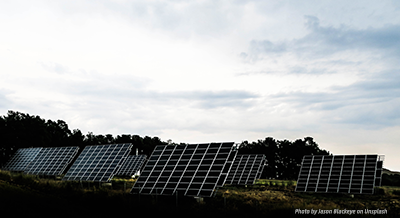
Renewable Energy Pitfalls in the Philippines
By Atty. Irwin C. Nidea Jr.
 Many people are now aware of the catastrophic effects of climate change. Protests all over the world that are spearheaded by a child (Greta Thunberg) are now gaining traction. Action is now being demanded by the future generation. One of their significant demands is that we shy away from fossil fuel, which is the primary cause of climate change. Nations must tap the unlimited resources of renewable energy, instead—sun, wind, water.
Many people are now aware of the catastrophic effects of climate change. Protests all over the world that are spearheaded by a child (Greta Thunberg) are now gaining traction. Action is now being demanded by the future generation. One of their significant demands is that we shy away from fossil fuel, which is the primary cause of climate change. Nations must tap the unlimited resources of renewable energy, instead—sun, wind, water.
The Philippines, being located in the ring of fire and is predicted to be adversely affected by climate change, has recognized the need to give priority to renewable energy by enacting the renewable energy law (RE law). This law aims to encourage stakeholders to develop and build facilities that will produce renewable energy by giving them tax incentives.
When an RE developer sells fuel or power generated from renewable sources of energy, the sale is imposed zero percent value-added tax. Also, the purchases of local supply of goods, properties and services related to the development, construction and installation of the power facilities are imposed zero percent VAT. But importation of equipment is not given the same incentive because only local purchases that will be used for the construction and development of RE facilities are given that privilege. Since sale of RE is zero-rated, it follows that all input VAT derived from importation are attributable to such zero-rated sale. There is no output VAT from which the input VAT derived from importation can be offset. It must follow that the input VAT is refundable.
Unfortunately, refund of input VAT is not cast in stone. Members of the Philippine courts are divided on two issues. These must be resolved to determine the viability of a refund claim by an RE developer: a) whether an RE developer must first engage in sale of renewable energy before it can ask for refund of its input VAT; b) whether the phrase “attributable to” means that only input VAT from purchases that are “directly” used for the production of renewable energy is refundable.
"The Philippines, being located in the ring of fire and is predicted to be adversely affected by climate change, has recognized the need to give priority to renewable energy by enacting the renewable energy law (RE law). This law aims to encourage stakeholders to develop and build facilities that will produce renewable energy by giving them tax incentives."
 Should an RE developer first engage in sale of renewable energy before it can claim refund of its input VAT?
Should an RE developer first engage in sale of renewable energy before it can claim refund of its input VAT?
One school of thought is that an RE developer must have already declared a sale of renewable energy before it can avail of the refund mechanism. In other words, if an RE developer is still building the facilities and is not yet operational, all input VAT derived from its importation and other sources can never be refunded. This is based on the premise that the input VAT must be “attributable” to a zero-rated sale. Since the RE developer is still in its preoperation stage, there is no zero-rated sale from which the input VAT may be attributable to.
The second school of thought, on the other hand, argues that all future sale of an RE developer is zero-rated VAT anyway. As long as it is shown that there is a sale of renewable energy, albeit not in the same period that the input VAT was incurred, it must follow that the input VAT incurred and paid by an RE developer is attributable to the sale of renewable energy. An RE developer has no other objective but to engage in zero-rated sales, i.e., sale of fuel or power generated from renewable energy. Thus, all input VAT incurred from preoperation stage is refundable.
The phrase “attributable to zero-rated sales” does not refer only to sales that had already occurred in the past, but can be made to refer to sales yet to be made. The law does not require a taxpayer to have zero-rated sales in prior period or within the period covered by the claim before filing a refund of its input taxes. In other words, the law does not require that in a claim for refund of input VAT that there be sale of renewable energy at the time the claimed input VAT was incurred or paid.
What does “attributable to” mean?
What is your purpose?
This is a fundamental question not just in life, but also in the struggle to find meaning to the phrase “attributable to.” What is the purpose of the pen and the paper that were used by an RE developer to order the machines needed to operate a solar panel? They only have one purpose—to harness solar energy.
But the input VAT derived from the purchase of the pen and the paper used in buying the machines is in danger of not being qualified for refund. It may eventually be considered as not “directly” attributable to the sale of solar power, or any renewable energy for that matter.
Who is to say what is directly attributable to zero-rated sales and what is not? There is no clear rule.
One school of thought argues that it will result in subjective judgment per item of purchase, with no clear and legal guidelines other than the vague parameter of the word directly.
RE developers have no other objective but to engage in zero-rated sales, i.e., sell power derived from renewable energy. If you say that the pen and the paper are not directly attributable to zero-rated sale, when there is no other purpose for the pen and the paper but such sale, you also have to say the same on the helmets of human beings who construct the buildings of a renewable-energy facility. In other words, if you will conclude that the pen and the paper are not as important as the solar panel, you should also be ready to conclude that the helmets used by the workers to protect their heads are not as important as the same solar panel.
It is worth noting that Revenue Regulation 9-89 has set guidelines that companies engaged in purely zero-rated sales are entitled to VAT refund.
The second school of thought, on the other hand, believes that the law clearly wants to preserve or restrict the refund incentive only to those which are directly attributable to the zero-rated sales—sale of renewable energy. What if the RE developer is only engaged in zero-rated sales (sale of renewable energy) and does not generate output taxes against which to offset the input taxes incurred outside of its zero-rated sales? It argues that refund is not an option while the business exists.
These are two issues that make investors think twice of investing on RE in the Philippines. The risk of not being able to recover input VAT while it explores, develops and builds the RE facilities that will harness the sun, wind and water is imminent.
I hope that when the dust settles, the policy-makers and the courts will see the true and only objective of harnessing renewable energy, and that is to produce sources of energy without compromising the future of our children.
The author is a senior partner of Du-Baladad and Associates Law Offices, a member-firm of WTS Global.
The article is for general information only and is not intended, nor should be construed as a substitute for tax, legal or financial advice on any specific matter. Applicability of this article to any actual or particular tax or legal issue should be supported therefore by a professional study or advice. If you have any comments or questions concerning the article, you may e-mail the author at This email address is being protected from spambots. You need JavaScript enabled to view it. or call 403-2001 local 330.




